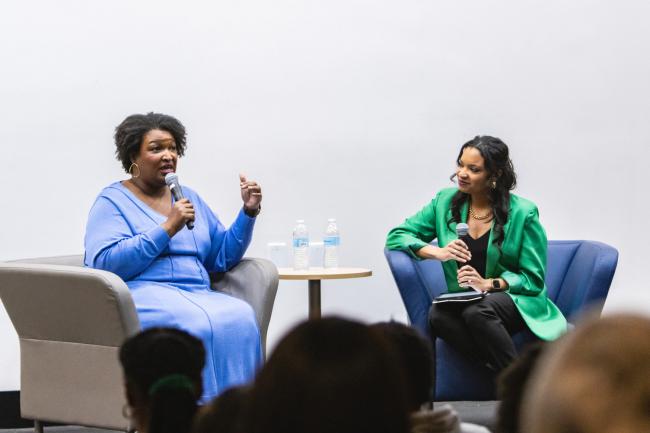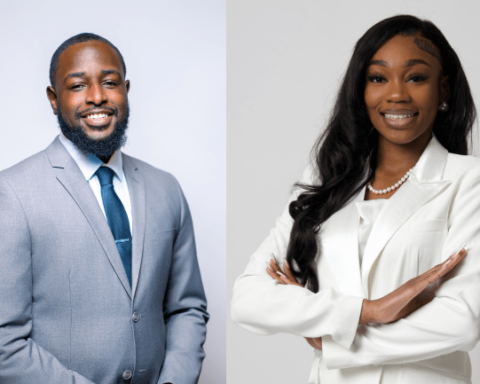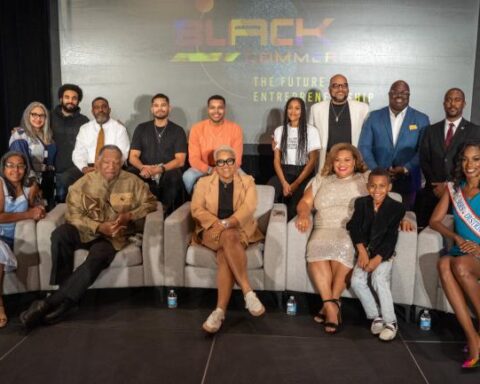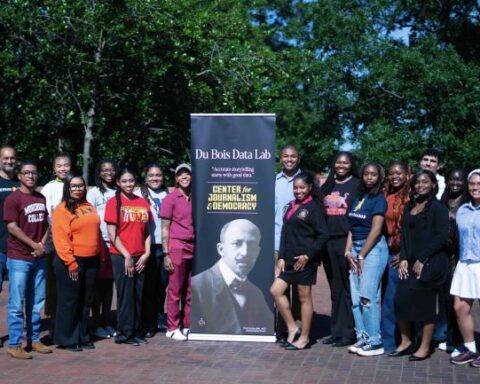By Brooke Brinson
On Wednesday, January 24, Stacey Abrams, Esq., kicked off her series of fireside chats at the inaugural Ronald W. Walters Endowed Chair for Race and Black Politics before a full house inside the Howard University School of Business Auditorium.
Abrams, an author, former minority leader of the Georgia House of Representatives and the first Black woman to run for governor of Georgia on a major political party ticket, used her inaugural chat to remind students of the importance of getting engaged in the voting process.
“Politics is a fancy word for how we treat each other. Government is nothing more than an assembly of people deciding who we value and how we’re going to show who we value,” Abrams said during the hourlong chat, which was moderated by Tia M. Dickerson, a Ph.D. candidate in the sociology department and graduate assistant to Abrams.
“When we decide to not participate, we’re deciding to let someone else tell us who our people are.”
Abrams brought awareness to the importance of HBCUs, offering advice to students on self-discovery through failure, and how to get and stay politically involved. As a student at Spelman College, Abrams was herself politically engaged. e She participated in protests calling for the removal of Georgia’s state flag, which incorporated the Confederate flag, and interning with former Mayor Maynard Jackson’s youth services department. She graduated with a bachelor’s degree in interdisciplinary studies in 1995.
Although young and likely to experience feelings of imposter syndrome or low confidence, Abrams encouraged students to find beauty in failure. She stressed the importance of not being defined by failures but looking at them as lessons learned instead.
“I learn my lessons, not my losses. You excavate the challenges and find the things you can do better,” said Abrams.
She offered to students that though they may not be where they want to be as young leaders, they should still “do something, somewhere, soon” to find their passions and help their communities. Students in the audience repeated this mantra several times to emphasize the importance of taking action and effecting change.
With a focus on the importance of voting, Abrams’ message for students was that politics is for everyone, regardless of their interests, experiences or background. Taking the opportunity to demystify concepts that students have likely heard but may not fully understand, Abrams explored issues like gerrymandering and voter suppression and their impact on the Black community.
According to Abrams, who founded Fair Fight Action in 2018 to address voter suppression, the issue of voting rights boils down to three questions: Do you have the right to vote and stay on the roll? Can you cast a ballot? Does your ballot get counted?
After her discussion, Abrams had the chance to hear from students like Tariyah Highland in a question-and-answer session. Highland, a junior political science major from Wilmington, Del., is president of the Howard University Chapter of Black Girls Vote.
Highland gauged Abrams’ point of view on how she can continue to mobilize young Black women as it relates to voting rights. Highland expressed that Abrams’ answer was empowering and ignited a spark in her to continue the work she does to get more young Black women involved in the electoral process.
She hopes to do more work in voting and continue these conversations with Abrams soon. “It was empowering to hear from her because she understands what it’s like to mobilize voters, especially young Black voters. It was encouraging to hear her offering tangible perspectives and insights like holding more voter registration drives,” said Highland.
The fireside chat was the first in a series of events that will bring experts to the Howard University campus as part of the Ronald W. Walters Chair Speaker Series. Abrams will return to campus monthly to engage the Howard University community in discussions surrounding politics, the environment, elections, diversity, equity, inclusion, and more.





